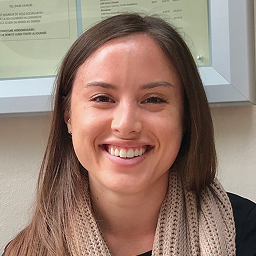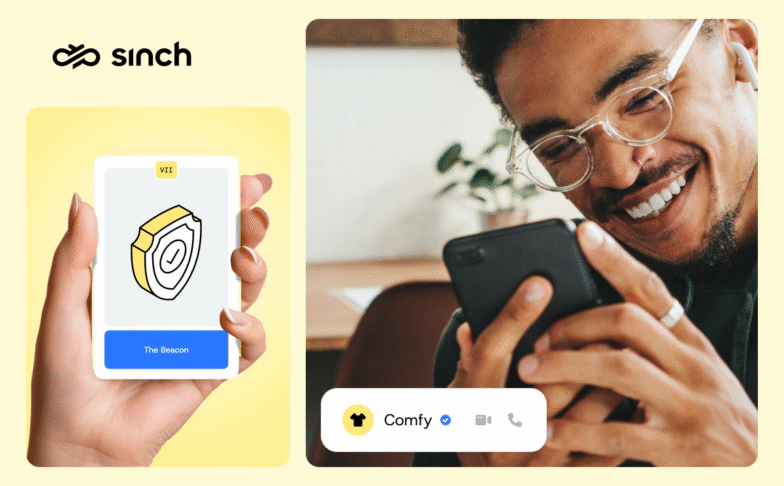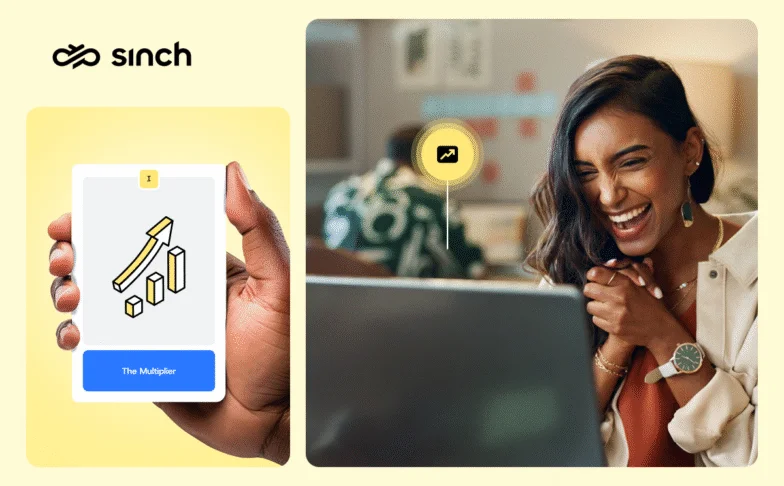Insights
RCS in healthcare: The cure for broken patient communications
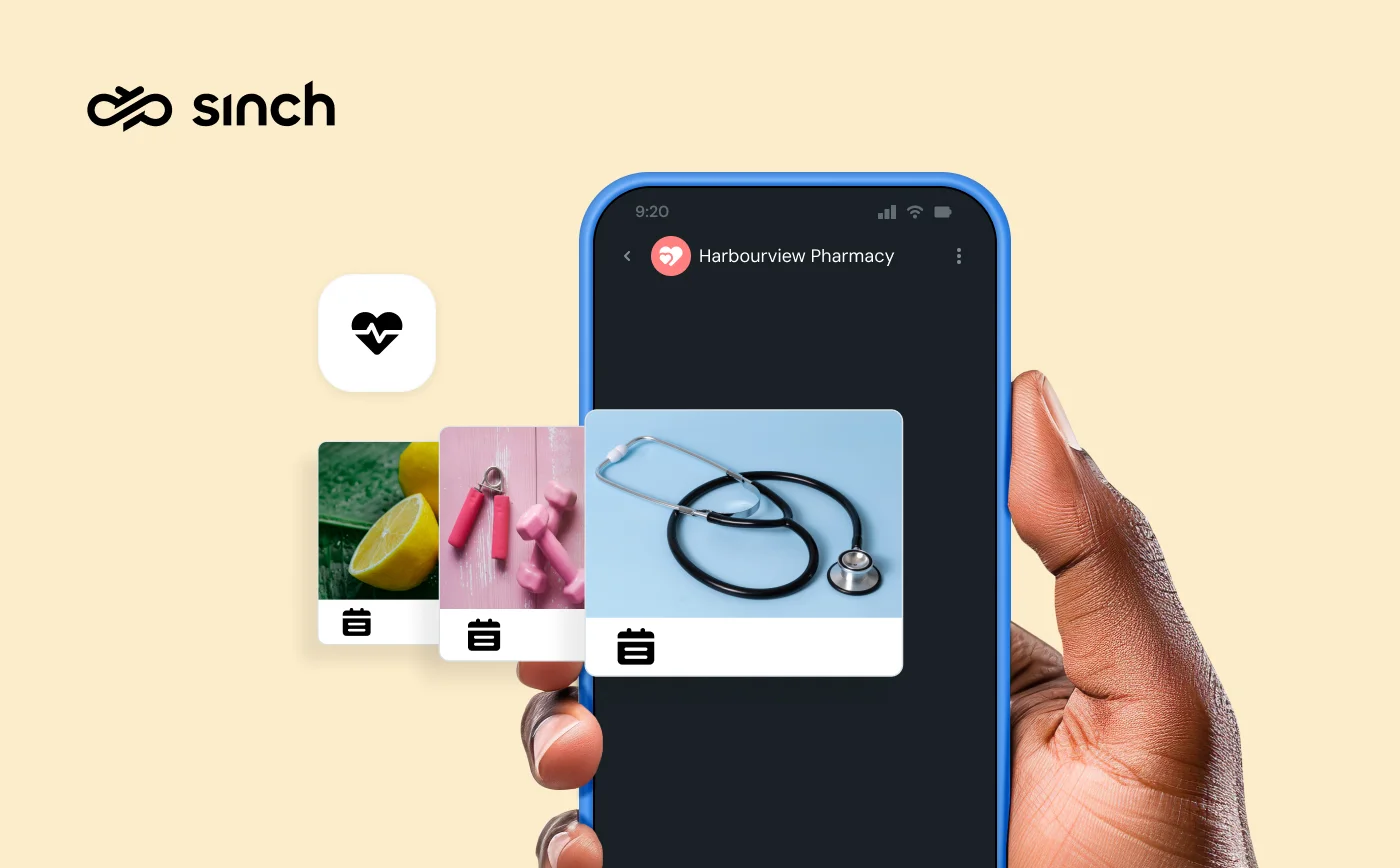
When communication breaks down in healthcare, the impact shows up in real ways, like through missed appointments, delayed follow-ups, and frustrated patients. It’s rarely a question of care quality, but rather how clearly and consistently that care is communicated. That’s why every message matters. The right communication builds trust, supports better outcomes, and protects patient privacy.
To understand how healthcare communications stand today, we surveyed 2,800 global consumers and more than 400 healthcare leaders for our 2025 State of RCS in customer communications report. And what we found is simple: Patients expect more, and providers know it. Those doing it right are building trust, confidence, and stronger relationships.
But knowing isn’t the same as doing. Many healthcare organizations are still wrestling with fragmented systems, privacy concerns, and tools that don’t talk to each other, all while trying to meet patients where they are and deliver better experiences. But that’s where Rich Communications Services (RCS) can help, with secure, branded messaging built for the way patients connect today.
What healthcare providers are up against (2025 survey insights)
Many healthcare organizations are under pressure. They’re managing high patient volumes and complex systems that don’t always work together, all under the strain of strict regulations and limited resources. These challenges came through clearly in our research.
When we asked over 400 healthcare leaders about their top communication challenges, they pointed to:
- Security and compliance (46%), reflecting the strict regulations healthcare providers must meet.
- System integration (42%), which makes it harder to deliver consistent, connected messages when tools aren’t necessarily built to work together.
- Cost (38%), showing that scaling communication isn’t getting any easier.
And when selecting communication tools, more than 80% of healthcare leaders we surveyed said that privacy laws like GDPR, CCPA, and HIPAA are a top concern, reinforcing just how central compliance is to every decision they make.
Meanwhile, patients expect more from the messages they receive from their healthcare providers.
- 83% of consumers want personalized messages.
- 55% expect proactive care messages like follow-ups and reminders.
- 42% trust messages more when they come from verified senders, a number that jumps to 71% for Gen Z and 59% for millennials.
It’s a lot to manage, but it’s also an opportunity to think about how communication can support better care. And RCS can offer real help in that regard. We’ll go through that next.
Why RCS is great for healthcare communications
With both Android and Apple now supporting RCS, more healthcare providers have the opportunity to explore it. Our 2025 research found that 90% of healthcare leaders are at least somewhat familiar with RCS, and more than half (56%) say it’s a game-changer for patient communication. In fact, 45% are already using or planning to use it this year.
That level of interest makes sense because RCS lets healthcare organizations send more secure, branded, interactive messages that feel more like an app experience, but without needing one. All messages are delivered in a patient’s default mobile messaging inbox.
Used strategically, RCS can help providers build trust and increase engagement with patients. See how this can work in a quick explainer from Sinch RCS Commercial Product Manager Miriam Liszewski.
Watch for a quick overview on how healthcare brands can use RCS to improve communication and connect more meaningfully with patients.
Of course, when we’re talking about healthcare communications, one question always comes up fast: what about HIPAA? It’s an important consideration, so let’s address it head-on.
Is RCS HIPAA-compliant?
Nope, and that’s important to know.
RCS shouldn’t be used to send protected health information (PHI). This is clearly outlined in Google’s RCS for Business Terms of Service, and it means anything involving personal medical data is off-limits.
In this video, Miriam Liszewski from Sinch answers a common question: Is RCS HIPAA compliant? Spoiler: it’s not. However, that doesn’t mean RCS is off the table for healthcare providers.
But there are still many effective, compliant use cases for RCS in healthcare. And while it can’t be used for sharing PHI, it’s a more secure way to communicate general updates, reminders, and educational content. We’ll walk through a few examples next.
Five healthcare use cases where RCS shines
Patients expect more from healthcare communication during their entire care journey, from appointment reminders to post-visit follow-ups.
Let’s take a look at a few use cases where RCS can make a real impact in healthcare.
1. Appointment reminders and follow-ups
When patients miss appointments, the impact can be immediate, both for their health and for the healthcare provider. In our consumer survey, 57% of respondents said appointment confirmations were very important, and 36% said appointment follow-up messages mattered just as much. Nearly half (47%) said they’d be less likely to miss an appointment if they received a timely reminder.
RCS gets those messages across in a clear, credible way. Because messages come from a verified, branded sender, patients know they’re legitimate. And when you add in appointment details, tap-to-reschedule buttons, and embedded maps, RCS makes life a whole lot easier for your patients.
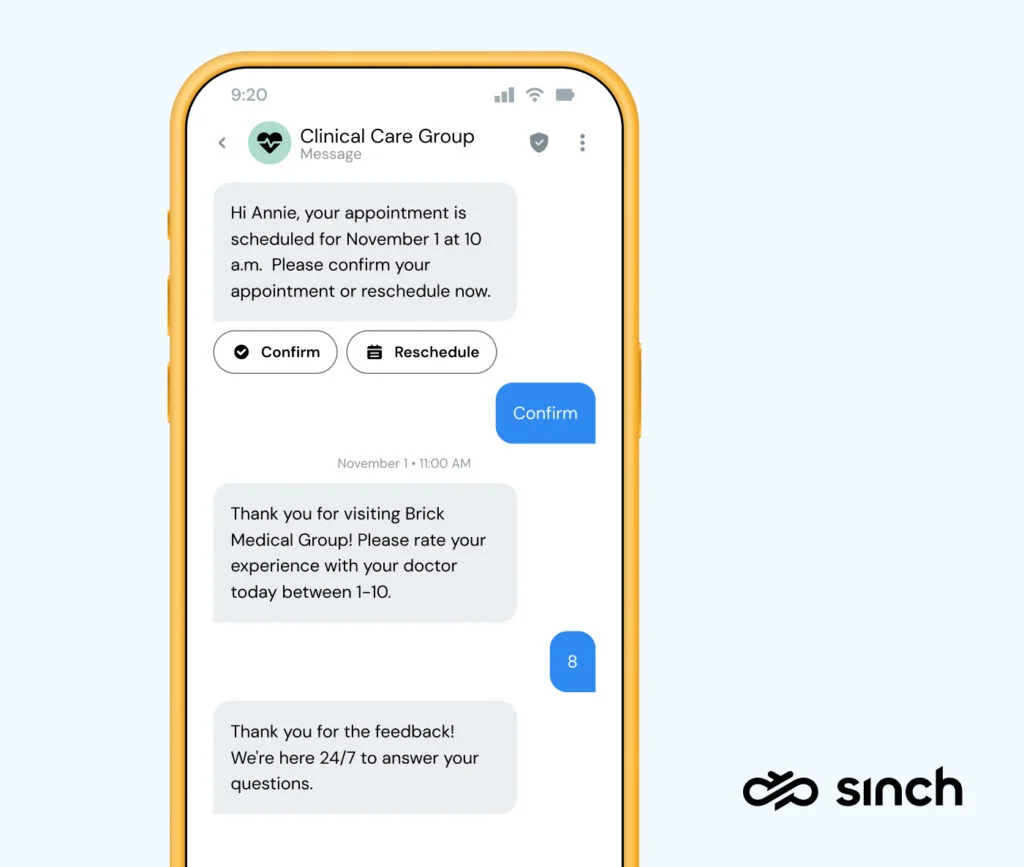
2. Secure identity verification
Trust starts with knowing who’s on the other end of a message, especially in healthcare. That could be why 57% of healthcare survey respondents believe improved security is a potential benefit of RCS, and another 46% believe RCS will help increase patient trust in the messages they receive.
of healthcare respondents believe improved security is a benefit of RCS.
believe RCS will help increase trust among patients receiving the message.
This makes sense. While RCS shouldn’t be used for PHI, it’s a strong fit for secure, non-sensitive touchpoints like when verifying a patient’s identity or sending one-time passwords. Both layers of encryption and branded sender verification add layers of trust above SMS, and patients will instantly recognize who the message is from.
3. Proactive, preventative care
Preventative care only works when it’s personal and easy to act on. Yet many providers still rely on non-personalized reminders that can get buried. That’s a missed opportunity, especially when our data shows that 40% of healthcare organizations plan to invest in AI in 2025.
RCS helps bring proactive care to life in a more engaging way, especially when those RCS messages are integrated with a chatbot that can give personalized information back to a patient. This means seasonal flu shot reminders, wellness tips tailored to a patient’s age group, and more.
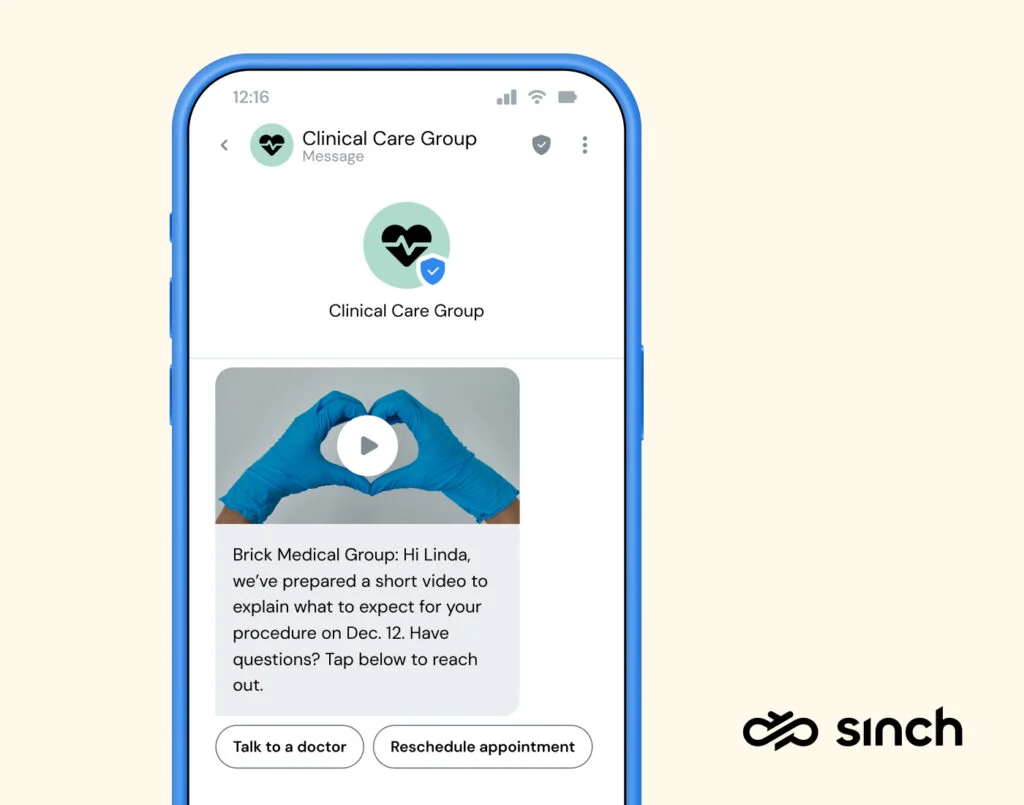
4. Prescription refills and medication reminders
Staying on top of medications is a key part of successful care, but it’s easy for patients to forget a dose or miss a refill. In our survey, 53% of healthcare respondents said increased patient engagement is a benefit of RCS. And automated prescription refills could be an impactful way to make that happen.
That’s because RCS helps keep reminders clear and actionable. An RCS message can let someone know their prescription is ready, have a status update, and even allow someone to tap to confirm when they’ll come pick it up.
5. Post-care satisfaction and support
After a patient is discharged, their care shouldn’t stop. And patients notice when it does, especially when they have to repeat themselves across touchpoints. In fact, 59% of consumers told us that it’s important that the information they provide flows between channels.
RCS helps providers create a more connected post-care experience. One-tap surveys, follow-up flows with a chatbot, suggested actions to make a phone call or reschedule an appointment, and educational resources can all live in the same branded thread. That continuity makes support feel like an extension of the care experience, which is exactly what patients expect.
Bonus: Our survey also found that 41% of consumers said they’d use a healthcare AI chatbot if it meant they’d receive care faster. Clearly, people are open to automation if it provides speedy, easy answers – and RCS gives you a trusted way to do both.
Real-life inspiration for using RCS in healthcare: ATOL
ATOL, a leading optical retail chain in France, needed a better way to guide customers through the process of booking eye exams and purchasing glasses. The experience had to be mobile-friendly, personalized, and secure… and RCS checked all three boxes.
ATOL used RCS to send branded appointment messages that included eyewear suggestions, product visuals, and one-tap links to book a visit.
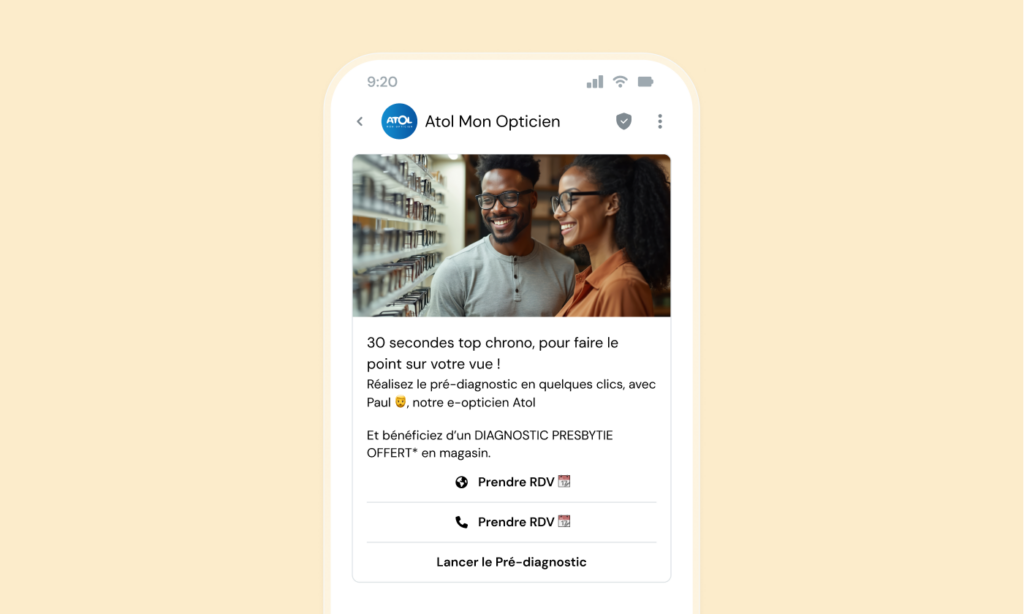
The campaign achieved impressive results:
- 5x higher click-through rate compared to Rich SMS
- 99% increase in in-store appointment bookings
Now imagine bringing that same approach to healthcare, sending patients easy-to-use appointment reminders, personalized follow-ups, or preventive care tips in a secure, branded thread. It’s a simple way to improve efficiency and build stronger patient relationships.
Patient engagement doesn’t have to be hard
Patients expect more from their healthcare providers. They have for a while. What’s changed is how much easier it is to meet those expectations with the right tools and channels in place.
Nearly 96% of healthcare providers say they plan to invest in customer communications in 2025. In the U.S., 46% said they plan to invest in RCS for Business, and 57% are prioritizing AI-powered solutions like chatbots. With both RCS and AI on the roadmap for so many healthcare providers, now’s the moment to turn patient expectations into better, connected experiences.
RCS gives healthcare providers a practical way to do that by sending branded, secure, and compassionate messages right to the messaging inbox patients already use. And when you combine that with AI-powered interactions, the result is a more seamless customer care journey.
With Sinch Conversation API, you can deliver those experiences across channels without reinventing your tech stack, so you can focus less on the infrastructure and more time improving the patient experience.


